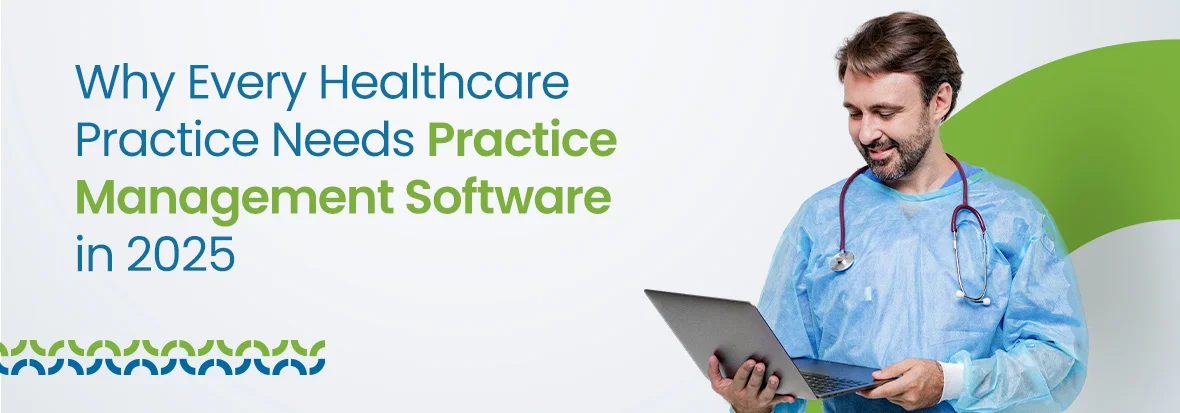Not too long ago, healthcare practices were overwhelmed by mountains of paperwork, disjointed software, and processes that took up more time than patient care itself. Think of a small practice trying to keep track of appointments on a whiteboard, medical records on paper, and billing scattered across Excel sheets. It’s chaotic, prone to errors, and eats up a lot of valuable time.
Billing errors, missed appointments, long waits for patients, and late payments were common issues. Let’s not forget the frustration of trying to manually keep up with regulations, codes, and insurance claims. Patients had a hard time getting timely care, and providers were bogged down by the back-office mess.
In this blog, we will explain how automation and intelligence can streamline every aspect of your practice, including financial, administrative, and more—through a unified practice management system.
So, What’s the Challenge? Why Do You Need PMS Right Now?
By 2025, healthcare has evolved with technology, and practices are adopting digital tools like practice management software to simplify their operations. What was once a luxury has now become a necessity.
These systems now integrate everything from patient scheduling to billing and medical records, all in one place. No more siloed software or manual entry. With PMS, practices can efficiently handle appointments, improve patient satisfaction, stay on top of billing, and ensure that they are compliant with ever-evolving regulations—all from a single platform
Let’s discuss the top challenges healthcare providers face and how PMS is stepping in to solve them:
Increased Administrative Burden and Operational Complexity
Healthcare practices are often burdened with administrative tasks, and as the complexity of care increases, so does the need for efficient management. Staff is required to manage appointments, patient data, billing, coding, and insurance claims, all while maintaining compliance with various regulations.
How PMS Helps:
- Automated Workflow: Practice management software system automates various administrative tasks, including appointment scheduling, insurance verification, and claim submissions. For example, by automatically sending patient reminders and managing cancellations, PMS reduces no-show rates and optimizes scheduling.
- Data Integration: All patient information, billing data, and scheduling are integrated into one platform, reducing time spent on administrative tasks and improving accuracy.
Revenue Cycle Challenges and Claim Denials
Billing and coding errors remain one of the biggest obstacles to revenue collection. Claims are often denied due to incorrect codes, incomplete information, or missed deadlines, which can severely affect a practice’s cash flow.
How PMS Helps:
- Coding Accuracy and Real-time Validation: Modern practice management systems integrate advanced coding systems and offer real-time validation, ensuring that claims are accurate before submission. For instance, a cardiology practice using PMS will be able to cut down its claim denial rate by 50% within six months due to the automatic validation of ICD-10 codes and payer-specific requirements, which is a key component of cardiology medical billing.
- Faster Claims Submission: PMS speeds up the claims process by automating submission and tracking, reducing delays from manual entry. This helps practices accelerate their revenue cycle and lower outstanding AR (accounts receivable).
Data Security and Compliance with Evolving Regulations
In 2025, healthcare practices must be vigilant about protecting patient data and complying with increasingly complex regulations, including the Health Insurance Portability and Accountability Act (HIPAA) and the 21st Century Cures Act. Failure to comply can result in heavy fines and damage to a practice’s reputation.
How PMS Helps:
- Robust Data Security: PMS platforms are designed with strong security features to protect sensitive patient information. With encryption and multi-factor authentication, PMS helps healthcare practices stay HIPAA compliant and secure.
- Regulatory Updates: Practice management software automatically updates to keep up with changing regulations, so practices don’t have to constantly adjust their processes. Whether it’s new CPT codes or changes in insurance billing, these updates reduce the risk of non-compliance.
Patient Experience Expectations
Patients are demanding more convenience and transparency in their healthcare experiences. They expect easy access to their medical records, the ability to book appointments online, and fast communication with providers. Practices that fail to meet these expectations may lose patients to competitors who provide a more streamlined, digital experience.
How PMS Helps:
- Patient Portals: PMS systems often include patient portals that allow patients to view their medical records, schedule appointments, pay bills, and communicate with providers.
- Improved Communication: Automated reminders, follow-up messages, and easy access to appointment scheduling help practices stay in constant communication with patients, enhancing their experience.
Scalability and Adaptability
As healthcare practices grow, the systems they use need to scale and adapt without major disruptions. Expanding a practice, adding providers, or offering new services can be challenging if the management systems are not flexible.
How PMS Helps:
- Effortless Scaling: PMS systems help practices grow without disruption. New locations or providers can be added easily. For example, a multi-location dental practice in New York can expand to several new locations while keeping centralized management. This can lead to a 15% reduction in overhead costs across all locations.
- Adaptation to Value-Based Care: PMS solutions are built to support the shift toward value-based care by integrating with tools like Electronic Health Records (EHR) and telemedicine platforms.
Practice Management Software: A Critical Tool for the Future of Healthcare
Practice management system is now a must-have for healthcare practices to stay organized and efficient. If you are looking for the best practice management software at an affordable price backed by an expert team, contact MedCare MSO.
Maximus, our PMS software, is built to adapt to the changing demands of your growing practice, prioritizing improved reimbursement rates and increased profitability. It provides comprehensive insights into each stage of your revenue management process, so you can make well-informed decisions.
Request a demo to explore how it can benefit your practice.

